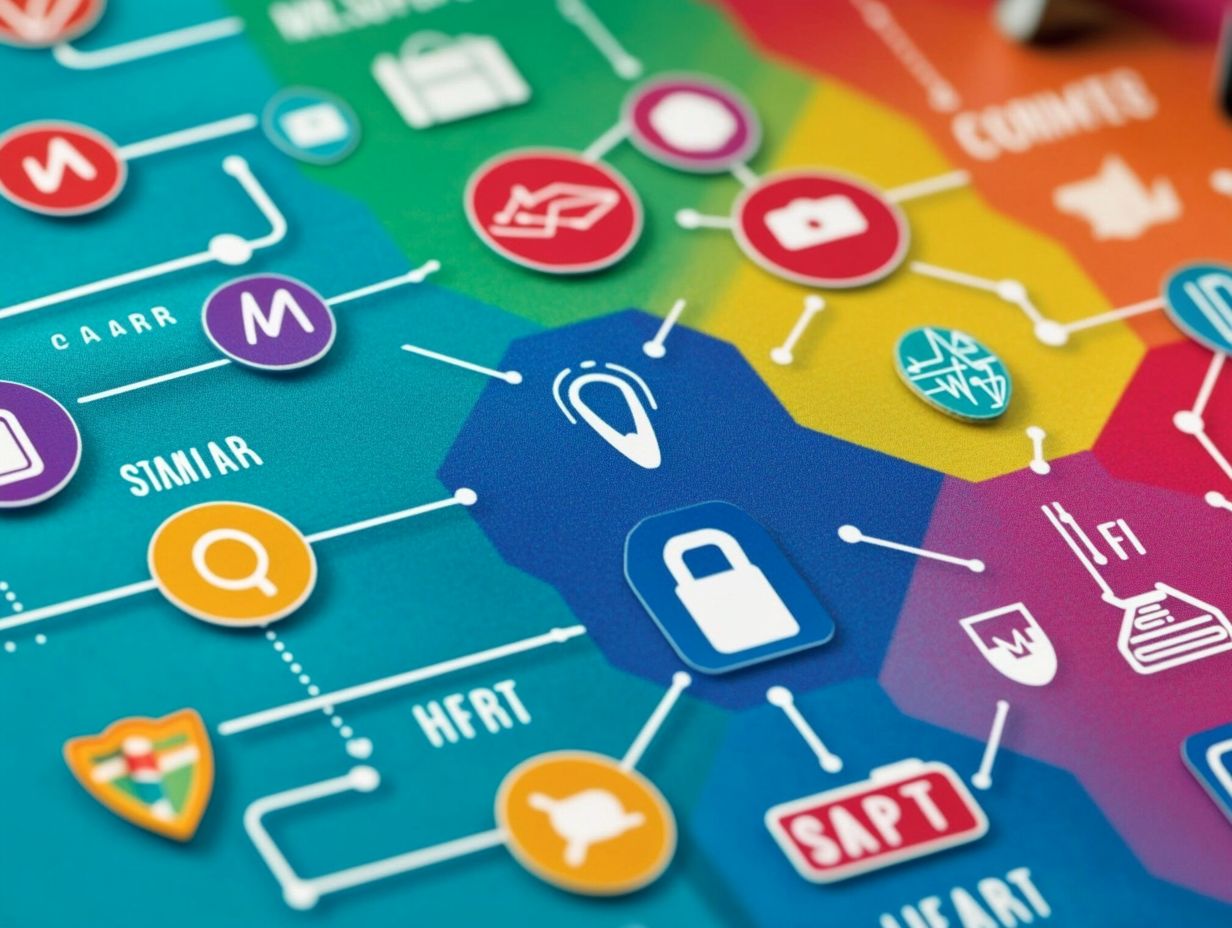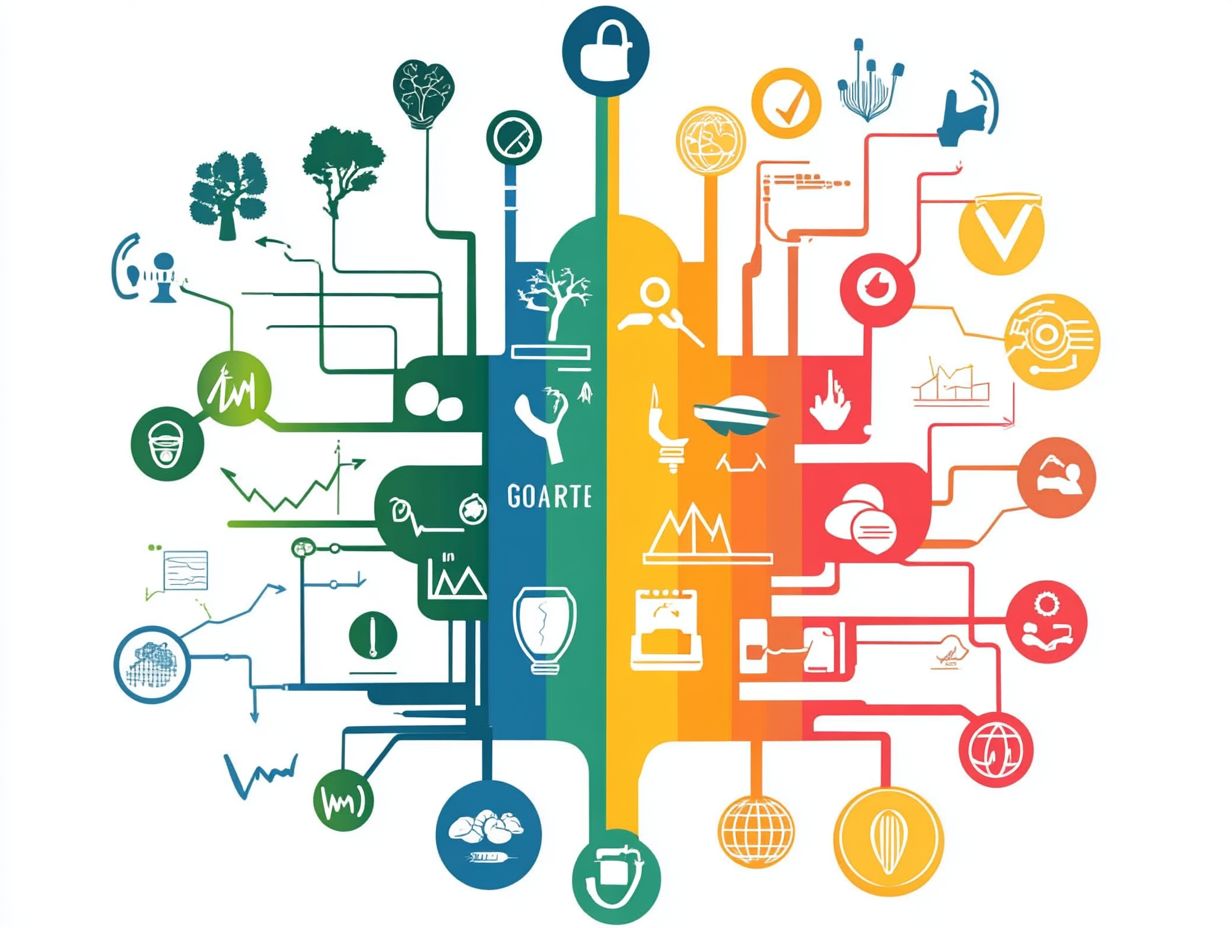Examples of SMART Goals for Every Area of Life
Setting goals is crucial for building a happy life, guiding your actions and decisions across various areas. Whether you’re aiming to advance in your career, achieve financial independence, or improve your health and relationships, having clear objectives can illuminate your path forward.
This article explores SMART goals specific, measurable, achievable, relevant, and time-bound tailored to different areas: career, finance, health, personal growth, education, travel, social connections, and contributions. Get clear on your goals now to start your exciting journey toward success!
Contents
- Key Takeaways:
- 1. Career Goals
- 2. Financial Goals
- 3. Health and Fitness Goals
- 4. Personal Growth Goals
- 5. Relationship Goals
- 6. Education Goals
- 7. Travel Goals
- What Do You Want to Achieve in Terms of Travel?
- How Will You Measure Your Progress?
- What Steps Will You Take to Reach Your Travel Goals?
- 8. Social Goals
- What Do You Want to Achieve in Terms of Social Connections?
- 9. Contribution Goals
- Frequently Asked Questions
- What are some examples of SMART goals for personal development?
- How can I set SMART goals for my career?
- What are some examples of SMART goals for financial success?
- How can I set SMART goals for my relationships?
- What are some examples of SMART goals for personal well-being?
- How can I set SMART goals for personal growth?
Key Takeaways:

- Set specific, measurable, achievable, relevant, and time-bound goals for every area of your life, such as career, finances, health, personal growth, relationships, education, travel, social connections, and contributions.
- To measure your progress towards your goals, identify key metrics and regularly track them to stay motivated.
- Create an action plan with tangible steps to reach your goals, and regularly review it to ensure success in every area of your life.
1. Career Goals
Establishing clear career goals is vital for your personal growth and professional development. These goals provide direction and motivation, allowing you to measure your progress in your chosen field.
By setting SMART goals, you enhance accountability and create a structured planning process that lays the groundwork for long-term success and meaningful career advancement.
To define effective career goals, be precise about what you want to achieve and how you plan to measure success. This involves outlining steps like acquiring new skills or obtaining certifications, along with setting deadlines to assess your progress.
Keep an eye on your progress to stay motivated and excited about your journey. Engaging with accountability partners can further ignite your motivation; sharing your goals with someone encourages consistency.
Incorporating successful habits like daily time management or weekly goal reviews into your routine can solidify your journey, ensuring your ambitions remain in sight.
What Do You Want to Achieve in Your Career?
Identifying what you want to achieve in your career is the critical first step in setting effective career goals, guiding your journey toward personal development and fulfillment.
This process requires deep self-reflection, where you can explore your passions, strengths, and aspirations. By aligning your personal values with specific objectives, you can craft a roadmap that ignites your motivation and nurtures a profound sense of purpose.
Engaging in journaling, seeking feedback from mentors, or participating in workshops can help clarify these aspirations, ensuring that your chosen path resonates with your true self.
This alignment transforms your career ambitions into actionable steps, leading to enriching experiences and meaningful achievements.
How Will You Measure Success?
Measuring your success in your career is essential for maintaining motivation and accountability, enabling you to track your progress toward your defined goals.
By utilizing various metrics and tools, you gain a clearer picture of your professional journey. Performance reviews offer insights into your strengths and identify opportunities for improvement, while skill assessments reveal gaps in your abilities, guiding you in planning targeted development initiatives.
Personal satisfaction is equally critical, reflecting the alignment between your career pursuits and personal values.
Cultivating successful habits such as consistent goal-setting and actively seeking feedback can significantly enhance your ability to achieve measurable outcomes and foster continuous growth.
What Steps Will You Take to Reach Your Career Goals?
To achieve your career goals, it’s crucial to outline actionable steps that align with your long-term vision. Incorporating successful habits into your daily routine will significantly enhance your efforts.
This strategic planning begins by defining clear and specific objectives. These will elevate your motivation and sharpen your focus. Break these goals down into smaller, manageable tasks, allowing you to regularly assess your progress.
For example, dedicating time each day to skill development like mastering new software pertinent to your field can significantly enhance your expertise. Establish a routine that includes networking activities, such as attending workshops or participating in industry-related discussions, to forge valuable connections.
Consider partnering with an accountability buddy to check in on milestones. This will help maintain your motivation and ensure that both of you stay on track toward your aspirations.
2. Financial Goals
Setting financial goals is essential for achieving your financial independence and stability. These goals will guide your budgeting decisions, savings strategies, and overall financial well-being.
By formulating clear financial goals, you create a roadmap for your economic future. This enables you to track your progress and make necessary adjustments along the way. This process also holds you accountable to your ambitions.
As you develop these goals, consider breaking them down into short-term, medium-term, and long-term objectives. This structured approach to financial planning will serve you well.
Utilizing budgeting methods like the zero-based budget, which means allocating every dollar to specific expenses, or the 50/30/20 rule, can help you allocate funds effectively across various needs. Modern financial tools and apps such as Mint, YNAB (You Need A Budget), or Personal Capital can streamline the tracking of your expenses and savings with ease.
Tracking your financial progress through written goals not only reinforces your commitment but also highlights areas for improvement. This ensures that the habits you cultivate in your everyday spending contribute to lasting financial success.
What Do You Want to Achieve Financially?
Determining what you wish to achieve financially is the essential first step in setting effective financial goals. Knowing what you want gives you clear direction to achieve your goals!
Through self-assessment, you can uncover your true financial aspirations. This will help you gain a clear understanding of your savings goals, investment targets, and strategies for debt reduction.
This introspective process outlines the specific steps required to reach your ambitions while fostering a more disciplined approach to your personal finances.
When you define concrete objectives, you cultivate a sense of purpose and motivation. This will ultimately enhance your financial decision-making.
As you break down your goals into manageable milestones, you’ll experience greater financial clarity and confidence, enabling you on your path to fiscal well-being.
How Will You Measure Financial Success?
Measuring your financial success is crucial for truly grasping your economic progress. This allows you to fine-tune your strategies to effectively meet your financial goals.
By utilizing various methods like net worth tracking, you can gain valuable insights into your overall financial health. Budgeting assessments provide a clearer view of your spending habits and reveal potential areas for improvement.
Evaluating investment performance showcases your returns and assists in identifying your risk tolerance. This helps you align with your long-term objectives.
When you set your financial goals in a measurable format, you can strategically navigate your journey toward financial independence. This ensures that you make necessary adjustments along the way to stay on track and motivated.
Start defining your financial goals today to take control of your future!
What Steps Will You Take to Reach Your Financial Goals?
To successfully reach your financial goals, it s essential to outline clear, achievable steps that seamlessly integrate into your budgeting and financial planning processes.
Establishing a well-structured budget serves as a cornerstone for effective financial management. This allows you to categorize expenses and prioritize your savings. Exploring various investment options, like mutual funds a type of investment where many people pool their money to invest in stocks or bonds or stocks, can help grow your wealth over time while balancing inherent risks.
By practicing consistent saving strategies, such as the 50/30/20 rule, you can build a safety net for emergencies and future investments.
Equally important is establishing accountability measures. Consider partnering with a financial mentor or joining a support group to stay focused and committed to your essential financial goals.
3. Health and Fitness Goals
Setting health and fitness goals is crucial for enhancing your overall well-being and achieving a balanced lifestyle. These objectives create a clear framework for both your physical and emotional health improvements.
By establishing specific, measurable targets, you can track your progress and maintain focus on your journey. Clarity in your goals not only defines the path ahead but also instills a profound sense of purpose.
For example, incorporating regular exercise routines that gradually increase in intensity can keep you motivated and engaged. Finding a supportive community whether through friends, family, or local fitness groups provides invaluable encouragement and accountability.
Embracing dietary changes, such as incorporating more whole foods and reducing processed options, can also help you reach your fitness goals, creating a more holistic approach to your well-being.
What Do You Want to Achieve in Terms of Health and Fitness?
Identifying your goals in your health and fitness journey is crucial for establishing effective objectives that promote personal growth and enhance your overall well-being.
Engaging in self-assessment is vital in this process. It provides the clarity needed to understand your current physical fitness levels, weight management challenges, and emotional health aspirations.
By evaluating where you currently stand, you can pinpoint specific areas for improvement and craft realistic, measurable goals that resonate with your unique circumstances.
This thoughtful introspection boosts your motivation and helps you make informed decisions regarding your diet, exercise routines, and mental well-being strategies. Understanding your position on the path to better health lays a strong foundation for sustained progress and fulfillment.
How Will You Measure Your Progress?

Measuring your progress toward health and fitness goals is crucial for maintaining motivation and accountability. It allows you to effectively track your improvements.
By incorporating various methods, you can gain a comprehensive view of your journey. Utilizing fitness apps gives you access to real-time data on your workouts, nutrition, and overall activity levels, making it easier to identify trends and areas for improvement.
Health assessments, whether performed by professionals or through self-administered tests, give you valuable insights into your physical status and highlight where adjustments may be needed.
Regular check-ins with your accountability partners can supercharge your motivation and create a supportive environment that fosters growth.
Together, these strategies can significantly elevate your health and fitness experience. Start integrating these strategies today to transform your health and fitness journey!
What Steps Will You Take to Reach Your Health and Fitness Goals?
To achieve your health and fitness goals, act now to outline achievable steps. Integrate specific exercise routines and dietary changes that foster a healthier lifestyle.
This journey starts with setting clear, measurable objectives. It makes tracking your progress much easier over time.
Incorporating short, frequent workouts into your week can reap significant benefits. Pair that with mindful eating practices, like planning your meals in advance, to maintain a nutritional balance that supports your goals.
Don t forget, having someone by your side can make a huge difference! Finding a workout buddy or joining a supportive community can provide the motivation you need. Remember, consistency is key, and celebrating those small victories will keep your momentum alive.
4. Personal Growth Goals
Personal growth goals are essential for nurturing your self-improvement journey and finding more happiness in life. They offer a clear blueprint for your path of development and learning.
To define these goals effectively, emphasize specificity and measurability. Each aim should be well-defined and trackable.
Cultivating successful habits is key to maintaining motivation. For example, dedicating a little time each day to read a self-help book can create a routine that fosters ongoing learning.
Establish accountability through partnerships or app-based reminders to propel you forward. For more insights, check out how to align SMART goals with life changes. Here are some examples of learning goals:
- Mastering a new language to enhance communication skills
- Enrolling in a workshop to boost professional expertise
Both serve as valuable stepping stones toward your personal enrichment.
What Do You Want to Achieve in Terms of Personal Growth?
Identifying what you aim to achieve in personal growth is crucial for setting effective goals. This process helps you explore your emotional intelligence, which means understanding your feelings and how they affect your choices.
By cultivating self-awareness, you can pinpoint your strengths and identify areas for improvement. This is foundational for acquiring new skills.
Understanding these aspects creates a personalized roadmap for your development. This allows you to take a focused approach to learning new skills or enhancing the ones you already possess.
Ultimately, self-reflection acts as your mirror, providing insights that enable you to evolve and pursue your aspirations with clarity and confidence.
How Will You Measure Your Progress?
Measuring your progress in personal growth is essential for maintaining motivation and accountability. It allows you to evaluate the effectiveness of your development strategies.
Employ methods like journaling to document your daily experiences and reflections. Regularly assessing your goals clarifies your priorities and tracks the milestones you’ve achieved.
Engaging with accountability partners provides external perspectives. They offer constructive feedback and encouragement, enhancing your growth journey.
Together, these strategies create a comprehensive framework for evaluating your progress. This enables you to adapt and refine your personal growth plans effectively.
What Steps Will You Take to Reach Your Personal Growth Goals?
To achieve your personal growth goals, it’s crucial to outline achievable steps that align with your learning objectives and foster successful habits.
This means defining specific outcomes and breaking them down into smaller, manageable tasks. For example, if you’re looking to enhance your public speaking skills, consider joining a local Toastmasters club or practicing your presentations in front of friends.
Bringing accountability partners into your journey can be invaluable. These individuals can offer encouragement and constructive feedback to keep your motivation and focus intact.
By checking in regularly, you can celebrate your successes and brainstorm solutions for any challenges, ensuring the process remains engaging and effective.
5. Relationship Goals
Establishing clear relationship goals is fundamental to building strong connections with others. These objectives provide clarity in your intentions and actions.
Outline specific, measurable targets to track your progress and make adjustments as needed. This leads to more fulfilling interactions. Engage in open conversations about these goals with family and friends to ensure everyone is aligned and aware of each other’s expectations.
Improving your emotional well-being plays a significant role in building stronger connections. Start using strategies like practicing mindfulness, cultivating gratitude, and dedicating quality time for meaningful conversations. These habits foster understanding and reinforce a sense of community, allowing bonds to flourish naturally.
What Do You Want to Achieve in Your Relationships?
Identify what you want to achieve in your relationships as the crucial first step toward effective goals that enhance emotional well-being and connection.
Through self-assessment, clarify your communication objectives. This ensures you actively listen and express your needs transparently. This process equips you to navigate conflicts more skillfully and enhances family dynamics by fostering an environment of mutual respect and understanding.
Reflect on your personal values and aspirations to create a roadmap for healthier interactions. Recognizing areas for growth lets you develop strategies that lead to deeper connections and a more harmonious atmosphere.
How Will You Measure Success in Your Relationships?
Measuring success in your relationships is essential for understanding your emotional well-being and the quality of your connections.
Engage in open dialogues with loved ones for valuable insights into how these bonds are perceived. Personal reflections, like journaling your experiences, illuminate your emotional well-being.
Track your progress in communication such as the frequency of meaningful conversations or your ability to resolve conflicts. This offers a concrete way to assess your growth. Understanding how these elements contribute to your overall satisfaction cultivates healthier, more fulfilling relationships.
What Steps Will You Take to Reach Your Relationship Goals?
To reach your relationship goals, outline achievable steps that foster emotional well-being and strengthen your connections with others.
Create a routine that includes regular check-ins or quality time to nurture your relationships effectively. Invest in practices like active listening and open communication to enhance understanding and empathy among partners, friends, or family members.
Seek community support through local groups or online forums to share experiences and gain valuable insights. Engage in collaborative activities, attend workshops, or participate in social events to solidify these bonds, making it easier to maintain strong connections over time.
6. Education Goals
Setting education goals is essential for achieving academic success and nurturing a lifelong passion for learning. These goals provide a structured pathway for your educational journey.
Concentrate on clear, specific, and measurable objectives to pinpoint what you aspire to achieve and how to monitor your progress. This specificity helps craft a roadmap that informs your decision-making and prioritization in your studies. Teaming up with an accountability buddy can inspire and oversee your advancement.
Incorporate consistent habits, such as daily reviews, dedicated study time, or using productivity tools, to enhance your growth. This journey is not just about the destination but also about the enriching experiences you encounter along the way.
Start setting your goals now to transform your relationships and education!
What Do You Want to Achieve in Terms of Education?

Identifying your educational aspirations is the essential first step in crafting effective goals for your learning journey. This self-assessment clarifies what you truly want and helps you finish your degree, enhancing your qualifications and unlocking new opportunities.
It prompts you to reflect on the skills you need to acquire. This sets the stage for both personal and professional growth. By recognizing your strengths and pinpointing areas for improvement, you can align your educational pursuits with your future career path, ensuring that your journey remains relevant and fulfilling.
Embracing this mindset nurtures a culture of a commitment to learning throughout your life, highlighting that education is not merely a destination but an evolving process that adapts to your interests and the demands of the market.
How Will You Measure Your Progress?
Measuring progress in your education is crucial for grasping your academic achievements and maintaining accountability to your educational goals.
To effectively navigate this journey, employ various methods. Keeping track of your grades provides quantifiable insights into your performance across different subjects, giving you a clear picture of where you stand.
Skill assessments offer a nuanced view of your capabilities, shining a light on both your strengths and areas that may need improvement. Feedback from mentors or instructors can be invaluable, offering personalized guidance and constructive criticism that pave the way for your future success.
By combining these approaches, you can create a comprehensive overview of your educational progress, allowing for strategic adjustments to ensure continuous growth.
What Steps Will You Take to Reach Your Education Goals?
To achieve your educational goals, it’s crucial to outline clear, attainable steps that align with your learning objectives and cultivate effective habits.
Start by crafting a structured plan that incorporates regular study sessions, scheduled breaks for rejuvenation, and various methods for retaining information, such as note-taking and engaging in group discussions.
Establishing a consistent routine can significantly sharpen your focus, making it easier to navigate complex subjects by allocating dedicated time slots for each area of study.
Incorporating regular self-assessments and making adjustments to your plan will help monitor your progress, ensuring that your goals remain well within reach. Maintaining consistency with these practices can lead to remarkable personal growth and a rich educational journey.
7. Travel Goals
Establish your travel goals now! They are the key to enriching your life experiences and broadening your horizons. They provide the motivation and clarity needed for your adventures.
Focus on what makes a journey truly meaningful. Set specific objectives whether that s visiting a dream destination, immersing yourself in local culture, or acquiring new skills while traveling. The importance of measurability can’t be overstated; by setting clear benchmarks, you can assess your progress and cultivate a satisfying sense of achievement.
Implement budgeting strategies, like tracking your expenses or setting up a dedicated travel fund, to ease financial stress and ensure your plans are realistic.
Incorporate habits such as regular planning sessions and sharing your travel goals with friends to enhance your experience, fostering not just anticipation but accountability as you embark on your explorations.
What are your travel goals? Share them with us!
What Do You Want to Achieve in Terms of Travel?
Identifying your travel goals is the first step to enhancing your life experiences.
This involves deep self-reflection. Explore your personal interests, values, and dreams about travel.
What excites you about potential destinations? Is it thrilling adventures in nature, serene moments on a beach, or vibrant cultural excursions through cities?
Recognizing your desire for experiencing local cultures connecting with communities and trying new cuisines can enrich your trips.
This thoughtful consideration aligns your dreams with realistic travel plans that foster personal growth and create unforgettable memories.
How Will You Measure Your Progress?
Measuring your travel progress is essential for understanding how your adventures align with your goals and aspirations.
Employ methods like travel journals, detailed itineraries, and honest feedback from your experiences to gain invaluable insights.
Writing regularly in your travel journal captures the essence of each destination and encourages reflection on what truly matters.
Carefully crafted itineraries serve as your roadmap, helping you visualize your experiences and ensuring that you’re on track to achieve your objectives.
Gathering feedback from previous trips sheds light on what worked well and what could improve, enhancing your future adventures.
What Steps Will You Take to Reach Your Travel Goals?
To successfully reach your travel goals, outline achievable steps that blend planning, budgeting, and your personal preferences.
Start by identifying potential destinations that resonate with the experiences you seek, whether diving into rich cultures, embarking on thrilling adventures, or unwinding in serene locales.
Next, establish a realistic budget that covers transportation, accommodation, food, activities, and unexpected expenses.
Leverage online tools to compare prices and discover enticing deals, helping to stretch your financial resources.
As you proceed, ensure your itinerary remains flexible, allowing for spontaneous exploration while keeping your overall vision in focus.
This balance of foresight and adaptability will enrich your journey, creating cherished memories and a profound sense of satisfaction.
8. Social Goals
Setting social goals can supercharge your connections and cultivate a sense of belonging, providing both direction and purpose in your interactions.
Make sure your goals are clear and measurable right away this will boost your progress. Instead of a vague desire to meet new people, aim to attend two social events each month.
You can enhance your social connections through active listening and engaging in meaningful conversations.
Establishing successful habits, like regularly reaching out to friends or setting aside time for social activities, creates a framework for fulfilling interactions that strengthen your relationships.
What Do You Want to Achieve in Terms of Social Connections?
Identifying what you want to achieve in terms of social connections is your first step toward establishing effective goals that enrich your interactions.
Understanding these desires enables you to focus on the quality of your conversations, ensuring discussions are meaningful rather than superficial.
Maintaining friendships becomes easier when you are mindful of your interactions, fostering deeper connections that provide support and encouragement.
This reflective approach also helps expand your social networks, as you become aware of the types of relationships you seek.
By creating environments that inspire growth and collaboration, you open opportunities for deeper engagement.
In essence, self-reflection serves as your compass, guiding you toward more significant and fulfilling social experiences.
How Will You Measure Your Progress?
Measuring your progress in social goals is crucial. It helps you understand your connections and engagement level.
To gauge social success effectively, employ various methods. Consider thoughtful reflections on your experiences and emotional responses.
Gathering feedback from peers is vital. Their insights reveal social interactions you might overlook.
Tracking interactions over time through social media or face-to-face meetings visualizes your connections. This ultimately guides you to more meaningful relationships.
What Steps Will You Take to Reach Your Social Goals?
Outline action steps now to supercharge your engagement! It s about starting conversations and cultivating habits for ongoing communication.
Pinpoint specific social environments that resonate with you like clubs or community events. Dive in to forge meaningful relationships.
Set aside dedicated time each week for social activities. Surrounding yourself with supportive individuals enriches your experiences.
9. Contribution Goals

Establishing your contribution goals is essential for making a meaningful impact. They provide clarity about your intentions and actions.
Articulate your goals in a specific and measurable manner. Determine the actions you intend to take and how you will track your progress.
Instead of vague goals like helping the community, set clear ones like organizing monthly food drives for 100 families. Connect with local organizations to bolster your support.
What Do You Want to Contribute to the World?
Identifying what you wish to contribute is the first step in establishing effective goals. This process aligns your aspirations with concrete actions.
Whether you choose to volunteer or advocate, understanding your values is key. It helps you cultivate meaningful contributions.
How Will You Measure Your Impact?
Measuring your impact is essential. It helps you understand how effective your contributions are and ensures they align with your goals.
Use different methods to create a clearer picture of your influence. Gathering feedback from beneficiaries gives you direct insights into their experiences.
Community assessments offer a broader view. They evaluate changes in the local environment and capture shifts in attitudes and behaviors.
Self-reflection is also crucial. Taking time to think about your personal experiences unveils valuable lessons and highlights areas for growth.
These diverse approaches will help you discover the nuances of your impact and refine your strategies for future endeavors.
What Steps Will You Take to Reach Your Contribution Goals?
Outline achievable steps that resonate with your values. This will help you rally community support.
Start by identifying local needs that match your mission be it environmental sustainability, education, or social justice. Engage in community meetings or volunteer with local organizations to understand the challenges your neighbors face.
Set small, measurable objectives. This boosts motivation and fosters a sense of accomplishment, gradually cultivating habits that promote long-term involvement and impact.
As you build these habits, you ll create deeper relationships and increase trust within the community. This ultimately amplifies the contributions you can make over time.
Frequently Asked Questions
What are some examples of SMART goals for personal development?
- Exercise for 30 minutes daily for the next 3 months to improve physical health.
- Read one book each month to expand your knowledge.
- Attend a workshop to learn a new skill or improve an existing one.
- Practice mindfulness meditation for 10 minutes daily for better stress management.
How can I set SMART goals for my career?
- Increase sales by 10% in the next quarter using new marketing strategies.
- Obtain a certification in your field within the next 6 months.
- Request a promotion or salary raise after completing a specific project.
- Attend networking events and connect with at least 3 new professionals each month.
What are some examples of SMART goals for financial success?
- Save 10% of your monthly income for retirement starting this month.
- Pay off credit card debt within the next 6 months by allocating a specific amount each month.
- Invest in a new stock or mutual fund by year-end to diversify your portfolio.
- Create a budget and stick to it for the next 3 months to manage your finances better.
How can I set SMART goals for my relationships?
- Plan a date night with your partner every week for 3 months.
- Have at least one meaningful conversation with a family member or friend each week.
- Spend 30 minutes daily with your children.
- Attend couples counseling once a month to improve communication.
What are some examples of SMART goals for personal well-being?
- Get 7-8 hours of sleep each night for 3 months to improve your health.
- Include at least 5 servings of fruits and vegetables in your daily diet for the next month.
- Take a yoga class twice a week for 2 months to reduce stress.
- Drink at least 8 glasses of water every day.
How can I set SMART goals for personal growth?
Ready to transform your life? Here are some exciting SMART goals for personal growth:
- Volunteer at a local charity or organization for 5 hours each week for the next 3 months.
- Learn a new language within the next year by taking a class or using a language learning app.
- Complete a personal development course to enhance skills in a specific area.
- Step out of your comfort zone and try one new thing each week for the next 6 months.






